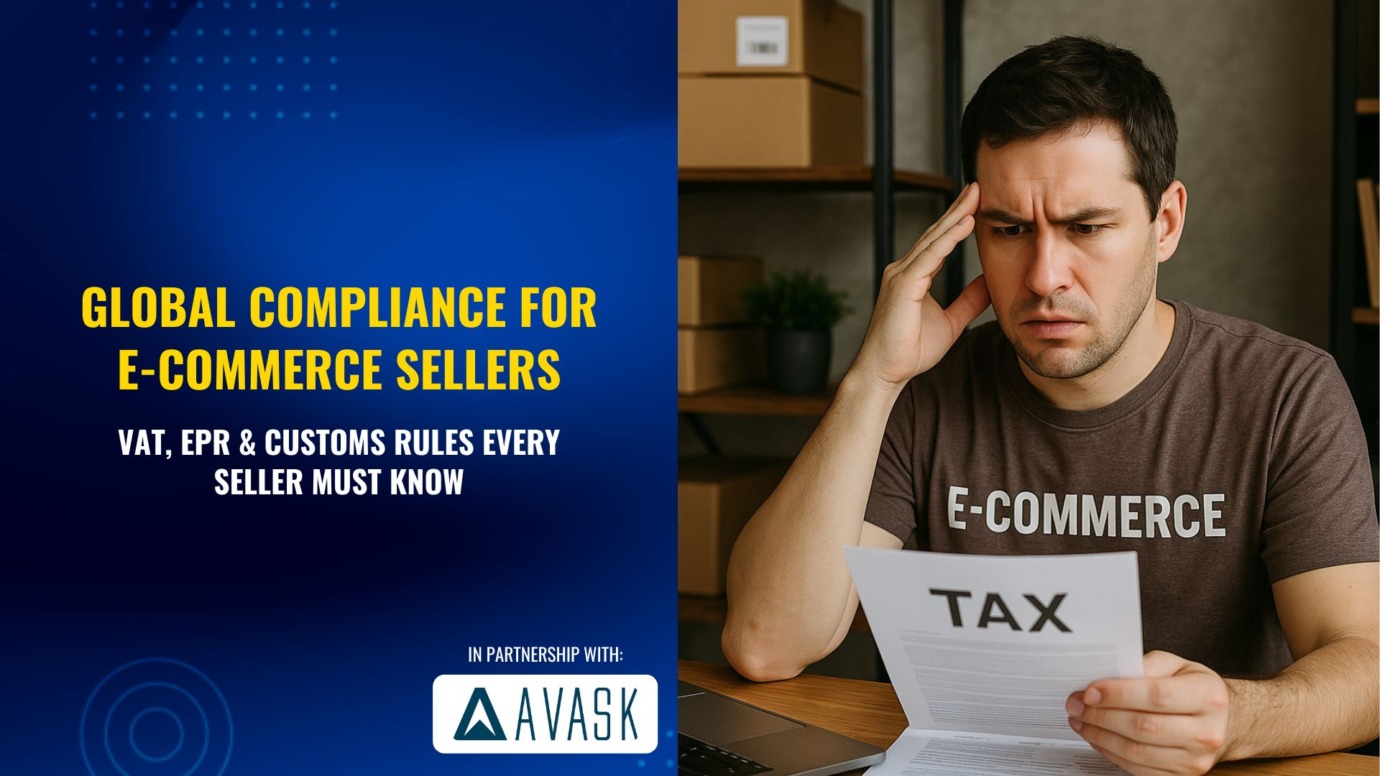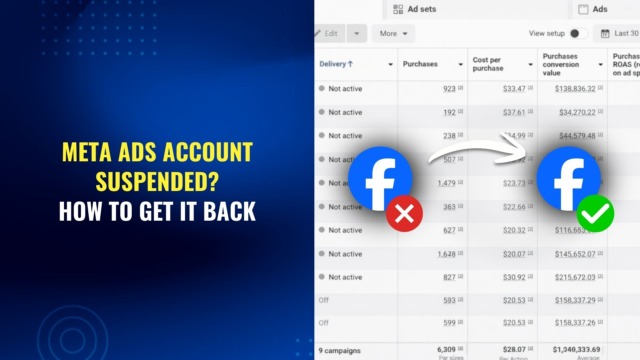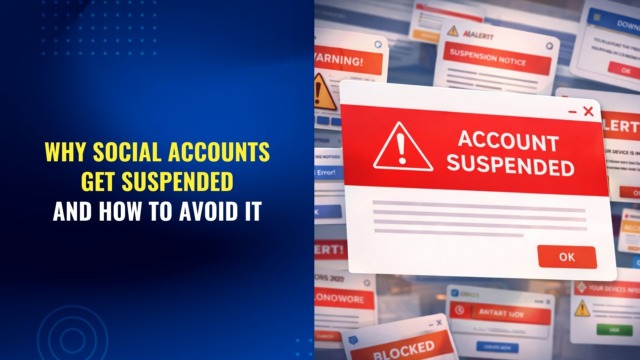
Book a FREE 15-minute consultation with an expert – Book Now
Selling Online? How to Stay Compliant in 2026 E-Commerce Tax, EPR & Customs Made Simple

If you’re building a business on platforms like TikTok Shop, Amazon, or Shopify and expanding into international markets, compliance probably isn’t the first thing you want to think about. But it’s becoming one of the most important things to get right.
This guide is for sellers like you: ambitious, growth-focused, and ready to navigate the rules that come with going global. We’ve broken it down into three core areas that are now defining success in international e-commerce:
- Tax compliance (VAT, sales tax, ViDA)
- Environmental compliance (EPR for packaging, electronics, etc.)
- Customs compliance (import/export rules and trade barriers)
Here’s a concise guide to the most significant changes in these areas, what marketplace sellers must do, and how you can stay ahead.
1. Tax Compliance: VAT, Sales Tax, and digital reporting
Sales tax in the United States
Sellers with an economic nexus in any US state must collect and remit sales tax. Economic nexus typically applies once a revenue or transaction threshold is met, even without physical presence. Marketplace facilitators often collect on your behalf, but sellers should monitor filing obligations in each state.
European Union – VAT in the Digital Age (ViDA)
Major changes are underway as ViDA is rolled out:
- Mandatory e-invoicing and real-time reporting will be phased in across EU member states.
- Extended Single VAT Registration (OSS) allows sellers to report all B2C sales across the EU from one country.
- Marketplaces may be jointly liable for VAT, increasing enforcement and scrutiny of seller compliance.
VAT in the United Kingdom
HMRC is modernising its systems under Making Tax Digital:
- More flexibility in final return submissions.
- Ongoing digitalisation of VAT filings.
- VAT de minimis threshold (£135) is under review, which could affect the duty-free status of low-value goods.
Marketplace tip: Use the EU OSS scheme to simplify multi-country VAT registration and reporting. Our partners at AVASK can assist with setup and filings across the EU and UK.
2. Environmental Compliance: EPR rules across the UK & EU
Sustainability regulations are becoming more stringent. Extended Producer Responsibility (EPR) is now critical to compliance when selling into the UK and EU.
EPR in the United Kingdom
As of 2025, sellers must:
- Report detailed packaging data, including where in the UK goods are sold and discarded (called ‘nation data).
- Pay waste management and regulator fees.
- Provide Packaging Waste Recycling Notes (PRNs) or Export Recycling Notes (PERNs).
- Comply based on turnover and packaging volume (e.g. over £1M and 25+ tonnes annually).
EPR in the European Union
The Packaging and Packaging Waste Regulation (PPWR) is phasing in, with full implementation by 2026. In 2025, sellers must:
- Begin transitional reporting.
- Assess packaging supply chains.
- Prepare for stricter labelling and recyclability requirements.
Many platforms now block non-compliant listings, and EPR applies even when using fulfillment services like Amazon FBA.
Digital Product Passports (DPPs)
If you sell (or are planning to sell) fashion or textiles into the UK and EU, prepare for QR-code-based DPPs, which will be required from 2027. These digital documents, already welcomed by green-minded consumers, provide product lifecycle data and support EPR compliance. Sellers planning to enter the UK/EU should begin implementing DPPs now to future-proof listings.
Marketplace tip: Ensure your listings remain live and compliant by staying on top of EPR registration, reporting, and advisory requirements across all relevant markets.
3. Customs Compliance: New import rules & trade measures
Customs compliance in the United Kingdom
The Border Target Operating Model (BTOM) introduces full controls on EU imports, including:
- Mandatory Entry Summary Declarations (ENS) from 31 January 2025.
- Sanitary and phytosanitary checks for certain goods.
- Digital-only transit processes—paper-based declarations are no longer accepted.
Reminder: Sellers using UK fulfilment centres may still be considered the importer of record and must comply accordingly.
Customs compliance in the European Union
The EU is building a centralised Customs Data Hub to unify reporting, improve risk management, and replace fragmented national systems.
Key customs requirements for the EU include:
- Accurate HS code classification.
- Valid origin declarations.
- Correct valuation and accompanying documentation.
The EU is also introducing a €2 handling fee on low-value parcels and removing the €150 VAT exemption. All imports, even low-ticket items, will require declarations.
Online marketplaces may soon be jointly responsible for customs declarations, so sellers must ensure their product information is complete and correct.
4. United States: Tariffs and trade shifts
While the US does not yet enforce EPR (but it’s potentially happening), it is implementing new trade measures. So far, what we know is that:
- As of April 2025, a 10% base tariff applies to most imports, with higher rates (30% +) for specific countries like China.
- The De Minimis exemption has been removed for Chinese goods under $800—these now require full customs clearance and duties.
- Tariffs may increase to 50% from July 2025 if no new trade agreements are reached.
Sellers relying on Chinese suppliers or exporting to the US must assess cost impact and explore mitigation strategies.
Marketplace tip: Consider re-evaluating supply chains and tariff classifications.
At a glance: your quick compliance checklist
- Register in all relevant jurisdictions and use OSS/IOSS where eligible
- Register for packaging, batteries, and electronics in the UK and EU.
- Ensure accurate HS codes, valuations, and clear IOR responsibilities.
- Comply with CE/UKCA, textile labelling, and upcoming Digital Product Passports.
- Keep proof of compliance, invoices, and declarations readily accessible.
- Regularly monitor platform-specific seller news for changes in enforcement.
Why does proactive compliance support matter?
Failing to meet tax, customs, or environmental regulations can result in:
- Account suspension
- Product delisting
- Fines and backdated liabilities
With marketplaces like Amazon, TikTok Shop, and eBay tightening enforcement, proactive compliance is essential to sustaining international growth, which means you need integrated support.
For international e-commerce sellers navigating complex tax and compliance requirements, having the right support is essential. We recommend working with AVASK, a trusted partner that helps businesses stay compliant and operate smoothly across borders. Their services include:
- VAT and sales tax registration and filings
- EPR registration and packaging reporting
- Customs declaration and duty planning
- Marketplace integration and regulatory monitoring
Stay ahead in a competitive e-commerce ecosystem
International e-commerce continues to evolve, bringing both new opportunities and growing complexity. As regulations tighten and marketplaces enforce stricter rules, success increasingly depends on preparation and adaptability. Staying ahead of compliance requirements isn’t just about meeting legal obligations, it’s a strategic advantage for building a scalable, long-term business.
By proactively managing VAT, EPR, customs, and other regulatory responsibilities, sellers can avoid costly disruptions, maintain visibility in the marketplace, and build trust with customers and partners. This foundation of compliance not only protects your business, but also opens the door to smoother expansion into new markets, stronger operational efficiency, and long-term growth in an increasingly competitive global landscape.
Legal Disclaimer: The articles published on our platform are for informational purposes only and do not constitute legal advice in any form. They are not intended to be a substitute for professional legal counsel. For any legal matters, it is essential to consult with us or a qualified attorney who can provide advice tailored to your specific situation. Reliance on any information provided in these articles is solely at your own risk.
Amazon Brand Registry – Discover for Free if You’re Eligible
Increase Your Chance of Getting a
Trademark to 96%
Subscribe to Our Newsletter
Sign up to receive valuable information on E-Commerce and intellectual property

